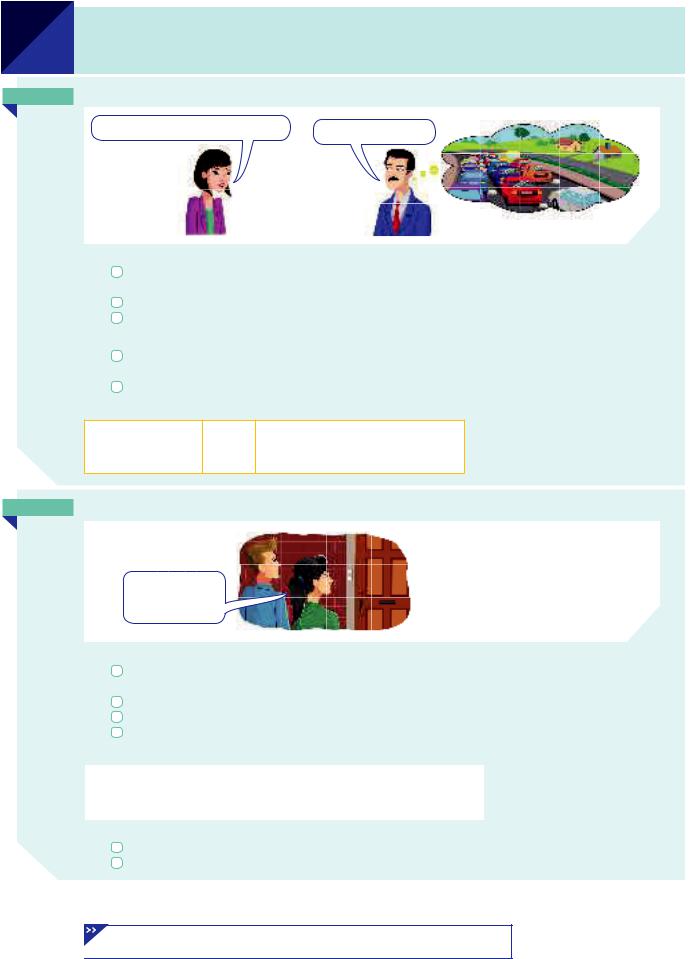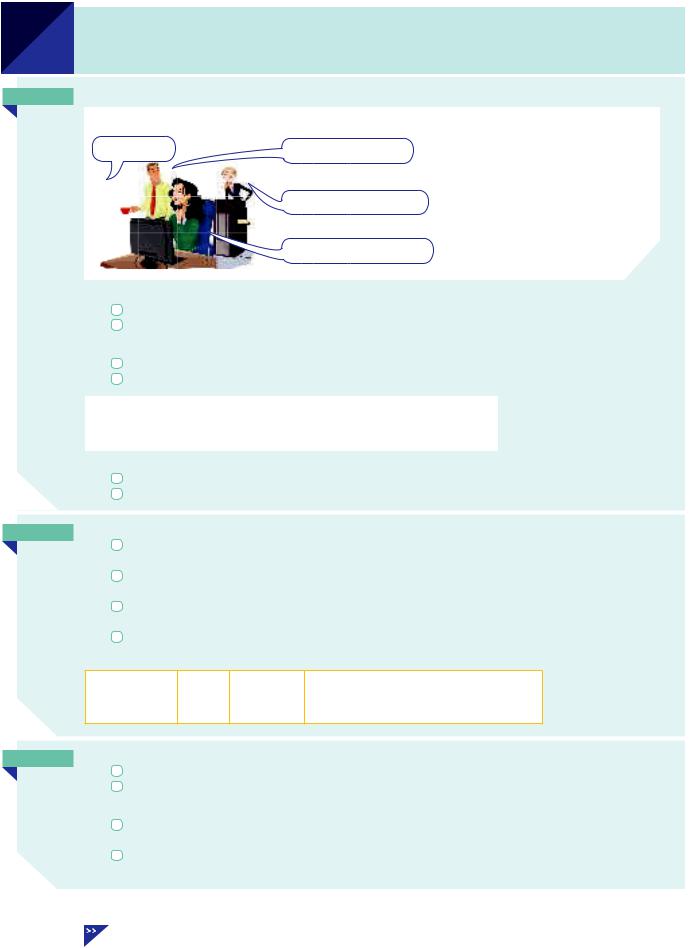
- •Contents
- •Thanks
- •To the student
- •To the teacher
- •3 Present continuous and present simple 1 (I am doing and I do)
- •10 Present perfect continuous and simple (I have been doing and I have done)
- •11 how long have you (been) … ?
- •12 for and since when … ? and how long … ?
- •13 Present perfect and past 1 (I have done and I did)
- •14 Present perfect and past 2 (I have done and I did)
- •15 Past perfect (I had done)
- •16 Past perfect continuous (I had been doing)
- •17 have and have got
- •18 used to (do)
- •19 Present tenses (I am doing / I do) for the future
- •20 I’m going to (do)
- •21 will and shall 1
- •22 will and shall 2
- •23 I will and I’m going to
- •24 will be doing and will have done
- •26 can, could and (be) able to
- •27 could (do) and could have (done)
- •28 must and can’t
- •29 may and might 1
- •30 may and might 2
- •31 have to and must
- •32 must mustn’t needn’t
- •33 should 1
- •34 should 2
- •35 I’d better … it’s time …
- •36 would
- •39 if I knew … I wish I knew …
- •40 if I had known … I wish I had known …
- •41 wish
- •42 Passive 1 (is done / was done)
- •43 Passive 2 (be done / been done / being done)
- •44 Passive 3
- •45 it is said that … he is said to … he is supposed to …
- •46 have something done
- •47 Reported speech 1 (he said that …)
- •48 Reported speech 2
- •49 Questions 1
- •52 Question tags (do you? isn’t it? etc.)
- •53 Verb + -ing (enjoy doing / stop doing etc.)
- •54 Verb + to … (decide to … / forget to … etc.)
- •55 Verb (+ object) + to … (I want you to …)
- •56 Verb + -ing or to … 1 (remember, regret etc.)
- •57 Verb + -ing or to … 2 (try, need, help)
- •58 Verb + -ing or to … 3 (like / would like etc.)
- •59 prefer and would rather
- •60 Preposition (in/for/about etc.) + -ing
- •61 be/get used to … (I’m used to …)
- •63 there’s no point in -ing, it’s worth -ing etc.
- •64 to … , for … and so that …
- •65 Adjective + to …
- •66 to … (afraid to do) and preposition + -ing (afraid of -ing)
- •67 see somebody do and see somebody doing
- •68 -ing clauses (He hurt his knee playing football.)
- •69 Countable and uncountable 1
- •70 Countable and uncountable 2
- •71 Countable nouns with a/an and some
- •74 the 2 (school / the school etc.)
- •75 the 3 (children / the children)
- •77 Names with and without the 1
- •78 Names with and without the 2
- •79 Singular and plural
- •80 Noun + noun (a bus driver / a headache)
- •81 -’s (your sister’s name) and of … (the name of the book)
- •82 myself/yourself/themselves etc.
- •83 a friend of mine my own house on my own / by myself
- •84 there … and it …
- •85 some and any
- •87 much, many, little, few, a lot, plenty
- •90 all every whole
- •91 each and every
- •92 Relative clauses 1: clauses with who/that/which
- •94 Relative clauses 3: whose/whom/where
- •95 Relative clauses 4: extra information clauses (1)
- •96 Relative clauses 5: extra information clauses (2)
- •97 -ing and -ed clauses (the woman talking to Tom, the boy injured in the accident)
- •98 Adjectives ending in -ing and -ed (boring/bored etc.)
- •99 Adjectives: a nice new house, you look tired
- •100 Adjectives and adverbs 1 (quick/quickly)
- •102 so and such
- •104 quite, pretty, rather and fairly
- •105 Comparative 1 (cheaper, more expensive etc.)
- •106 Comparative 2 (much better / any better etc.)
- •107 Comparative 3 (as … as / than)
- •108 Superlative (the longest / the most enjoyable etc.)
- •109 Word order 1: verb + object; place and time
- •110 Word order 2: adverbs with the verb
- •111 still any more yet already
- •112 even
- •114 in case
- •116 as (as I walked … / as I was … etc.)
- •117 like and as
- •119 during for while
- •121 at/on/in (time)
- •122 on time and in time at the end and in the end
- •123 in/at/on (position) 1
- •124 in/at/on (position) 2
- •125 in/at/on (position) 3
- •126 to, at, in and into
- •127 in/on/at (other uses)
- •129 Noun + preposition (reason for, cause of etc.)
- •130 Adjective + preposition 1
- •131 Adjective + preposition 2
- •132 Verb + preposition 1 to and at
- •134 Verb + preposition 3 about and of
- •135 Verb + preposition 4 of/for/from/on
- •136 Verb + preposition 5 in/into/with/to/on
- •137 Phrasal verbs 1 Introduction
- •138 Phrasal verbs 2 in/out
- •139 Phrasal verbs 3 out
- •142 Phrasal verbs 6 up/down
- •143 Phrasal verbs 7 up (1)
- •144 Phrasal verbs 8 up (2)
- •145 Phrasal verbs 9 away/back
- •Additional exercises
- •Study guide
- •Key to Exercises
- •Key to Additional exercises (see page 302)
- •Key to Study guide
- •Index

Unit
28 must and can’t
AStudy this example:
My house is very near the motorway.
It must be very noisy.
We use must to say that we believe something is certain:
You’ve been travelling all day. You must be tired.
(travelling is tiring and you’ve been travelling all day, so you must be tired) ‘Joe is a hard worker.’ ‘Joe? You must be joking. He doesn’t do anything.’ Louise must get very bored in her job. She does the same thing every day.
We use can’t to say that we believe something is not possible:
You’ve just had lunch. You can’t be hungry already.
(we don’t expect people to be hungry immediately ater a meal) They haven’t lived here for very long. They can’t know many people.
The structure is:
must
be (tired / hungry / at work etc.)
you/she/they (etc.) can’t be -ing (doing / going / joking etc.) get / know / have etc.
BStudy this example:
There’s nobody at home. They must have gone out.
Martin and Lucy expected their friends to be at home.
They rang the doorbell twice, but nobody has answered. Lucy says:
They must have gone out. (= there is no other possibility)
For the past we use must have … and can’t have … :
I lost one of my gloves. I must have dropped it somewhere. (that’s the only explanation I can think of)
‘We used to live very near the motorway.’ ‘Did you? It must have been noisy.’
Sarah hasn’t contacted me. She can’t have got my message.
Max walked into a wall. He can’t have been looking where he was going.
The structure is:
|
must |
|
been (asleep / at work etc.) |
|
I/you/he (etc.) |
have |
been -ing (doing / looking etc.) |
||
can’t |
||||
|
|
|
gone / got / known etc. |
|
|
|
|
|
You can use couldn’t have instead of can’t have:
Sarah couldn’t have got my message.
Max couldn’t have been looking where he was going.
|
can’t (‘I can’t swim’ etc.) Unit 26 must |
56 |
Modal verbs (can/will etc.) Appendix 4 |
|
|
(‘I must go’ etc.) Units 31–32 American English Appendix 7

Exercises |
|
|
Unit |
||
|
|
28 |
|||
|
|
|
|
|
|
|
|
|
|
||
28.1 |
Put in must or can’t. |
|
|
|
|
1 |
You’ve been travelling all day. You must be tired. |
||||
2 |
That restaurant |
be very good. It’s always full of people. |
|||
3 |
That restaurant |
be very good. It’s always empty. |
|||
4 |
I’m sure Kate gave me her address. I |
have it somewhere. |
|||
5 |
I oten see that man in this street. He |
live near here. |
|||
6 |
It rained every day during their holiday. It |
have been very nice for them. |
|||
7 |
Congratulations on passing your exam. You |
be very pleased. |
|||
8 |
This bill |
be correct. It’s much too high. |
|||
9 |
You got here very quickly. You |
have driven very fast. |
|||
10 |
Bill and Sue always stay at five-star hotels. They |
be short of money. |
|||
11 |
Karen hasn’t let the ofice yet. She |
be working late tonight. |
|||
28.2 Complete each sentence with a verb (one or two words).
1 |
I’ve lost one of my gloves. I must have dropped |
it somewhere. |
|
2 |
Their house is very near the motorway. It must be |
very noisy. |
|
3 |
You’ve lived in this village a long time. You must |
|
everybody who lives here. |
4 |
I don’t seem to have my wallet with me. I must |
|
it at home. |
5 |
‘How old is Ed?’ ‘He’s older than me. He must |
|
at least 40.’ |
6 |
I didn’t hear my phone. I must |
|
asleep. |
7 |
‘You’re going on holiday soon. You must |
|
forward to it.’ ‘Yes, I am.’ |
8 |
I’m sure you know this song. You must |
|
it before. |
9 |
The road is closed, so we have to go another way. There must |
an accident. |
|
10 |
‘Do you have a car?’ ‘You must |
|
! How could I aford to have a car?’ |
11 |
David is the managing director of a large company, so he must |
quite a high salary. |
|
28.3 Use the words in brackets to write sentences with must have and can’t have.
1 We went to our friends’ house and rang the doorbell, but nobody answered. (they / go out)
They must have gone out.
2 Sarah hasn’t contacted me. (she / get / my message)
She can’t have got my message.
3 The jacket you bought is very good quality. (it / be / very expensive)
4 I haven’t seen our neighbours for the last few days. (they / go away)
5 I can’t find my umbrella. (I / leave / it in the restaurant last night)
6 Amy was in a very dificult situation when she lost her job. (it / be / easy for her)
7 There was a man standing outside the cafe. He was there a long time. (he / wait / for somebody)
8 Rachel did the opposite of what I asked her to do. (she / understand / what I said)
9 When I got back to my car, it was unlocked. (I / forget / to lock it)
10My neighbours were making a lot of noise in the night. It woke me up. (they / have / a party)
11The light was red, but the car didn’t stop. (the driver / see / the red light)
12Paul has had these shoes for years, but they still look new. (he / wear / them much)
Additional exercises 16–18 (pages 311–13) |
57 |

Unit
29 may and might 1
AStudy this example situation:
You are looking for Ben. Nobody is sure where he is, but you get some suggestions.
Where’s Ben? |
He may be in his o ice. |
(= perhaps he is in his of ice) |
|
He might be having lunch. |
(= perhaps he is having lunch) |
|
Ask Kate. She might know. |
(= perhaps she knows) |
We use may or might to say that something is possible. You can use may or might:
It may be true. or It might be true. (= perhaps it is true)
She might know. or She may know.
The negative forms are may not and might not:
It may not be true. (= perhaps it isn’t true)
She might not know. (= perhaps she doesn’t know)
|
may |
|
be (true / in his of ice etc.) |
|
I/you/he (etc.) |
(not) |
be -ing (doing / working / having etc.) |
||
might |
||||
|
|
|
know / work / want etc. |
Note the diference between may be (2 words) and maybe (1 word):
It may be true. (may + verb)
‘Is it true?’ ‘Maybe. I’m not sure.’ (maybe = it’s possible, perhaps)
BFor the past we use may have … or might have … :
a: I wonder why Kate didn’t answer her phone.
b: She may have been asleep. (= perhaps she was asleep) a: I can’t find my phone anywhere.
b: You might have let it at work. (= perhaps you let it at work) a: Why wasn’t Amy at the meeting yesterday?
b: She might not have known about it. (= perhaps she didn’t know) a: I wonder why David was in such a bad mood yesterday.
b: He may not have been feeling well. (= perhaps he wasn’t feeling well)
may
been (asleep / at home etc.)
I/you/he (etc.) might (not) have been -ing (doing / working / feeling etc.) known / had / wanted / let etc.
Ccould is similar to may and might:
It’s a strange story, but it could be true. (= it is possible that it’s true)
You could have let your phone at work. (= it’s possible that you let it there)
But couldn’t (negative) is dif erent from may not and might not. Compare:
Sarah couldn’t have received my message. Otherwise she would have replied. (= it is not possible that she got my message)
Why hasn’t Sarah replied to my message? I suppose she might not have received it. (= it’s possible that she didn’t receive it – perhaps she did, perhaps she didn’t)
|
could Unit 27 may/might 2 Unit 30 may I … ? Unit 37C |
58 |
might with if Units 30B, 38C, 40D Modal verbs (can/will etc.) Appendix 4 |

Exercises
29.1 |
Complete the sentences. Choose from the box. |
|
|
1 |
a: Do you know where Helen is? |
|
|
|
|
b: I’m not sure. She might be in her room . |
|
2 |
a: Is there a bookshop near here? |
|
|
|
|
b: I’m not sure, but ask Anna. She |
. |
3 |
a: Where are those people from? |
|
|
|
|
b: I don’t know. They |
. |
4 |
a: I hope you can help me. |
|
|
|
|
b: I’ll try, but it |
. |
5 |
a: Whose phone is this? |
|
|
|
|
b: It’s not mine. It |
. |
6 |
a: Why doesn’t George answer his phone? |
|
|
|
|
b: He |
. |
7 |
a: Do you know anyone who has a key to this cupboard? |
||
|
|
b: Rachel |
, but I’m not sure. |
8 |
a: Gary is in a strange mood today. |
|
|
|
|
b: Yes, he is. He |
. |
29.2 Complete each sentence using the verb in brackets.
Unit
29
may be Tom’s
may not be feeling well may not be possible might be in her room might be Brazilian might be driving might have one
might know
1 |
a: Where’s Ben? |
|
|
|
b: I’m not sure. He might be having |
lunch. (have) |
|
2 |
a: Who was the guy we saw with Anna yesterday? |
||
|
b: I’m not sure. It may |
|
her brother. (be) |
3 |
a: Is Ellie here? |
|
|
|
b: I can’t see her. She may not |
|
yet. (arrive) |
4 |
a: Gary said he would meet us in the cafe, but he isn’t here. |
||
|
b: He might |
outside. I’ll go and look. (wait) |
|
5 |
a: How did John know that I’d lost my job? |
||
|
b: I don’t know. I suppose Sam may |
him. (tell) |
|
6 |
a: Do you know where Jef is? Is he still in the ofice? |
||
|
b: He was here earlier, but he might |
|
home. (go) |
7 |
a: Where’s Emma? What’s she doing? |
|
|
|
b: I’m not sure. She might |
|
TV. (watch) |
8 |
a: Does Max have any brothers or sisters? |
||
|
b: I’m not sure. I think he may |
|
a younger sister. (have) |
9 |
a: I can’t find my umbrella. Have you seen it? |
||
|
b: You may |
it in the restaurant last night. (leave) |
|
10 |
a: I rang Dan’s doorbell, but he didn’t answer. I’m sure he was there. |
||
|
b: He might not |
|
the doorbell. (hear) |
11 |
a: Hannah is supposed to meet us here, and she’s already 20 minutes late. |
||
|
b: She may |
. She’s always forgetting things. (forget) |
|
29.3 Complete the sentences using might not have … or couldn’t have … .
1 |
a: I was surprised Amy wasn’t at the meeting. Perhaps she didn’t know about it. |
|
|
b: Maybe. She might not have known |
about it. |
2 |
a: I wonder why Tom didn’t come to the party. Perhaps he didn’t want to come. |
|
|
b: It’s possible. He |
to come. |
3 |
a: I wonder how the fire started. Was it an accident? |
|
|
b: No, the police say it |
an accident. It was deliberate. |
4 |
a: Mike says he needs to see you. He tried to find you yesterday. |
|
|
b: Well, he |
very hard. I was in my ofice all day. |
5 |
a: The man you spoke to – are you sure he was American? |
|
|
b: No, I’m not sure. He |
. |
Additional exercises 16–18 (pages 311–13) |
59 |
